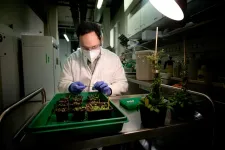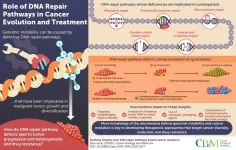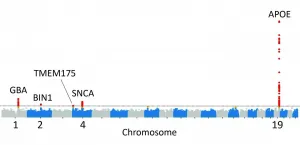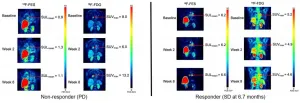(Press-News.org) Researchers from Skoltech and their colleagues have demonstrated that nanoengineered biodegradable microcapsules can guide the development of hippocampal neurons in an in vitro experiment. The microcapsules deliver nerve growth factor, a peptide necessary for neuron growth. The paper describing this work was published in the journal Pharmaceutics.
Many neurodegenerative conditions that can lead to severe disorders are associated with depleted levels of growth factors in the brain - neuropeptides that help neurons grow, proliferate and survive. Some clinical studies of Alzheimer's and Parkinson's diseases have shown that delivering these growth factors to specific degenerating neurons can have a therapeutic effect. However, it is rather hard to do in practice; when taken systemically, as a typical drug, they can have difficulty penetrating the blood-brain barrier and severe side effects. And using viruses to deliver them as a form of gene therapy means one cannot easily stop the treatment once it is initiated, which also leads to safety concerns.
Olga Sindeeva and Gleb Sukhorukov of Skoltech and Queen Mary University of London, together with their colleagues, decided to try to use targeted delivery in the form of microcapsules with an average size of 2 to 3 micrometers bringing one of these neuropeptides, nerve growth factor (NGF), directly to the needed location. To produce the capsules, the team used poly-L-arginine and dextran and the layer-by-layer technique, when very thin films are deposited, as the name suggests, layer by layer to form a capsule. Earlier studies showed that these capsules are biocompatible and can function properly both in tissue slices and in rodents, with no detectable adverse effects.
"Encapsulation via Layer-by-Layer (LbL) technology has an advantage, first of all, in its versatility, meaning the possibility to tailor different functions to the shell of the capsules and incorporate various cargo. Also, unlike many other encapsulation methods, LbL encapsulation is processed in aqueous conditions, which is absolutely compatible with such fragile molecules as some peptides, proteins and in particular growth factors," Sukhorukov said.
For their new experiment, researchers used cultures of rat hippocampal neurons, which were studied after adding the microcapsules. It turned out that NGF that was delivered in them boosted neuronal growth quite significantly, and this new growth was not arbitrary but rather directed towards the clusters of microcapsules. NGF also enhanced neurite branching, a process that leads to the formation of axons and dendrites, the main functional elements of a neuron. Finally, neurons treated with NGF in microcapsules were able to form functional synapses. If this approach works in clinical applications, it may mean a reversal of neurodegeneration observed in many diseases.
"The properties of LbL microcapsules can be tuned according to the application. So, biocompatibility, degradation and controlled release are defined by the choice of polymers used in capsule shell composition. Controlled release could also be achieved by external stimuli such as ultrasound, laser, or a magnetic field," Gleb Sukhorukov noted.
The team plans to test their technology of controlled release of NGF for a speedy recovery after neural injury. Earlier studies also showed that a similar approach can work with other growth factors such as basic fibroblast growth factor, a protein involved in a host of biological processes including embryonic development and tissue repair.
INFORMATION:
Other organizations involved in this research include University College London and Saratov State University.
Skoltech is a private international university located in Russia. Established in 2011 in collaboration with the Massachusetts Institute of Technology (MIT), Skoltech is cultivating a new generation of leaders in the fields of science, technology and business, is conducting research in breakthrough fields, and is promoting technological innovation with the goal of solving critical problems that face Russia and the world. Skoltech is focusing on six priority areas: data science and artificial intelligence, life sciences, advanced materials and modern design methods, energy efficiency, photonics and quantum technologies, and advanced research. Web: https://www.skoltech.ru/.
Scientists from the National Renewable Energy Laboratory (NREL) have developed a simple way to better evaluate the potential of novel materials to store or release heat on demand in your home, office, or other building in a way that more efficiently manages the building's energy use.
Their work, featured in Nature Energy, proposes a new design method that could make the process of heating and cooling buildings more manageable, less expensive, more efficient, and better prepared to flexibly manage power from renewable energy sources that do not always deliver ...
Last year, researchers at Karolinska Institutet in Sweden and the Max Planck Institute for Evolutionary Anthropology in Leipzig, Germany showed that a major genetic risk factor for severe COVID-19 is inherited from Neandertals. Now the same researchers show, in a study published in PNAS, that Neandertals also contributed a protective variant. Half of all people outside Africa carry a Neandertal gene variant that reduces the risk of needing intensive care for COVID-19 by 20 percent.
Some people become seriously ill when infected with SARS-CoV-2 while others get only mild or no symptoms. In addition to ...
How do plants build resilience? An international research team led by the University of Göttingen studied the molecular mechanisms of the plant immune system. They were able to show a connection between a relatively unknown gene and resistance to pathogens. The results of the study were published in the journal The Plant Cell.
Scientists from "PRoTECT" - Plant Responses To Eliminate Critical Threats - investigated the molecular mechanisms of the immune system of a small flowering plant known as thale cress (Arabidopsis thaliana). PRoTECT ...
The ongoing health disaster of the past 12 months has exposed the crises facing nursing homes in Canada and the United States and the struggles of the staff working in them.
Writing in the Journal of Comparative Policy Analysis: Research and Practice, PhD student Daniel Dickson, his supervisor Patrik Marier, professor of political science, and co-author Robert Henry Cox of the University of South Carolina perform a comparative analysis of those workers' experiences. In it, they look at Quebec (including those at government-run CHSLDs), British Columbia, Washington State and Ohio ...
Hamilton, ON (February 16, 2021) - A McMaster stem cell research team has made an important early step in developing a new class of therapeutics for patients with a deadly blood cancer.
The team has discovered that for acute myeloid leukemia (AML) patients, there is a dopamine receptor pathway that becomes abnormally activated in the cancer stem cells. This inspired the clinical investigation of a dopamine receptor-inhibiting drug thioridazine as a new therapy for patients, and their focus on adult AML has revealed encouraging results.
AML is a particularly deadly cancer that starts with a DNA mutation in the blood stem cells of the bone marrow that produce too many infection-fighting white blood cells. According ...
The ongoing fight of science against cancer has made great strides, but cancer cells have not made it easy. The complexity of cancer cells and their adaptive evolutionary nature complicate the search for effective cures. Multiple DNA repair pathways in healthy cells typically work to rectify DNA damages caused by sources within the organism, like spontaneous DNA mutations, or from outside, like ultraviolet radiation.
But what happens when these pathways malfunction? It is known that deficiencies in these pathways increase the instability of the genes, and this causes cancer to develop. Therefore, detailed knowledge of how DNA repair pathways participate in this process is crucial for tracking tumor progression, understanding the emergence of drug ...
Melanoma is by far the deadliest form of skin cancer, killing more than 7,000 people in the United States in 2019 alone. Early detection of the disease dramatically reduces the risk of death and the costs of treatment, but widespread melanoma screening is not currently feasible. There are about 12,000 practicing dermatologists in the US, and they would each need to see 27,416 patients per year to screen the entire population for suspicious pigmented lesions (SPLs) that can indicate cancer.
Computer-aided diagnosis (CAD) systems have been developed in recent years to try to solve this problem by analyzing images of ...
In a study led by National Institutes of Health (NIH) researchers, scientists found that five genes may play a critical role in determining whether a person will suffer from Lewy body dementia, a devastating disorder that riddles the brain with clumps of abnormal protein deposits called Lewy bodies. Lewy bodies are also a hallmark of Parkinson's disease. The results, published in Nature Genetics, not only supported the disease's ties to Parkinson's disease but also suggested that people who have Lewy body dementia may share similar genetic profiles to those who have Alzheimer's disease.
"Lewy body dementia is a devastating brain disorder for which we have no effective treatments. Patients often appear to suffer the worst of both Alzheimer's ...
Reston, VA--Molecular imaging can successfully predict response to a novel treatment for ER-positive, HER2-negative metastatic breast cancer patients who are resistant to hormonal therapy. According to research published in the February issue of the Journal of Nuclear Medicine, positron emission tomography (PET) imaging using an imaging agent called 18F-fluoroestradiol can help to determine which patients could benefit from treatments that could spare them from unnecessary chemotherapy.
Nearly two-thirds of invasive breast cancers are ER-positive, and endocrine therapy is the mainstay of treatment for these tumors because of its favorable toxicity profile and efficacy. Should cancer progress in these patients, however, salvage endocrine therapy with molecularly targeted agents ...
Of the nine treatments and preventives for COVID-19 authorized for emergency use by the Food and Drug Administration, three are drugs made from so-called monoclonal antibodies. Such drugs provide patients with ready-made antibodies that neutralize the virus, bypassing the body's slower and sometimes less effective process of making its own antibodies.
But such therapies were developed without detailed information about how antibodies interact with the rest of the immune system during COVID-19. Faced with a new, deadly and fast-spreading disease, drug designers started work ...





